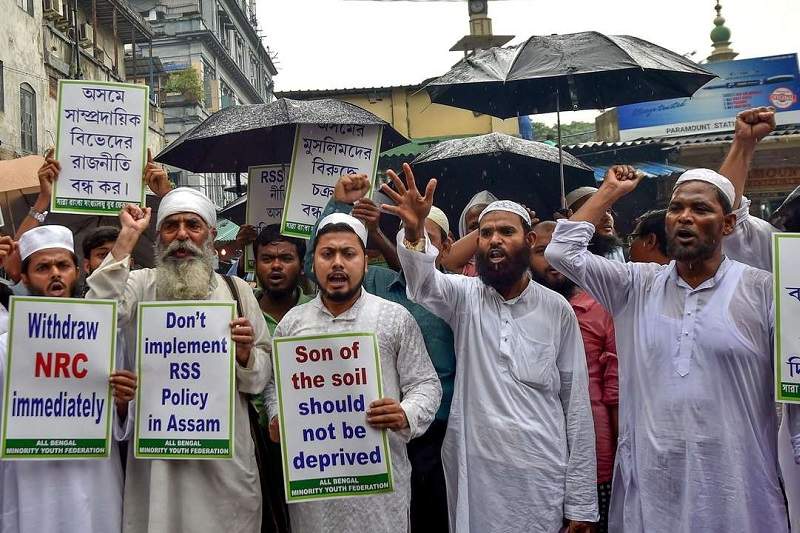- Sponsored -
The divide-and-rule policy, now and then

The entire belt of northeast is tense or in turmoil to be precise. Thanks to Narendra Modi government’s latest draconian move of the NRC, the northeastern states are on the verge of eruption. When Brits executed the divide and rule policy, majority of us were not born but we can now visualise what that might have been like back in those days.
- Sponsored -
The same divide-and-rule policy seems to have an ardent taker in modern India. The kind of policies that NDA has dished out over the last four years is not only affecting the common people but it is taking the country backward, as opposed to their election theatrics that Jawaharlal Nehru and the Gandhi family has taken the country back.
If we analyse the performance of this government, it will cast a doom spell, to say the least. From demonetisation to lynching, each and every move was aimed at forcing the country to follow one religion breaching the constitutional practice of secularism. Though the Narendra Modi-led government chose to stay away from commenting on these matters, his party leaders are at it in full swing. Some even went on to say things which are not endorsed by the Constitution of India.
Let’s start from demonetisation. The move that posed serious problems to the countrymen for months since November 8, 2016, didn’t yield any result in terms of development whatsoever as promised by the Prime Minister and his cronies. The word ‘development’ remained a word only on paper while the staunch supporters of the Rashtriya Swayamsevak Sangh (RSS) continued propagating issues like Hindutva which resulted in multiple lynching incidents throughout the country.
The deadly call of note bandi not only robbed many people of their livelihoods, it was also responsible for the countrywide hara-kiri post 2016. The nation still couldn’t absorb the shock it received.
Enter another draconian move — the introduction of one-nation-one-tax — Goods and Service Tax (GST). It was another decision that perturbed people across the length and breadth of the country. Come 2019, the discontent among the traders and consumers is something that may come back to haunt the saffron party in more ways than one.
However, the final nail in the coffin was this initial draft of NRC, which started with northeast state Assam. The move itself not only created a sense of despair among 40 lakh-plus people living in Assam whose names have been dropped. A source in northeast though shared some startling developments with this journalist. If the source is anything to go by, the Khashi youths (read Bhakts) even resorted to blocking the road connecting Assam and Meghalaya and asked for proper identity proof before entering the neighbouring state.
The state administration kept mum as tourist services from Guwahati to Shillong were disrupted in the absence of proper state machinery to handle such things. Union Minister of State for Home Affairs Kiren Rijiju recently said in an interview with a popular English news channel that those who support separatists should be called ‘anti-nationals’ but the matter of the fact is, while Rijiju talks of nationalism, he does forget the past shenanigans of the RSS.
If Indian Independence struggle is taken into consideration, it will show RSS in poor light as written by Shamsul Islam. Also, if RSS-published KB Hedgewar’s autobiography is any documentation, then the organisation must introspect its role in Indian freedom movement. In 1930, when Mahatma Gandhi launched the Salt Satyagraha movement, Hedgewar reportedly instructed all RSS workers to not participate in any movement which squarely helped the Britishers. Hope Rijiju reads this before getting down to business.
Post-Assam, the situation has come to such a juncture that a civil war, as stated by West Bengal Chief Minister Mamata Banerjee looks imminent at this point in time. If people face difficulties in moving around inside their domestic boundary, it will create an animosity among our own countrymen. Perhaps, this is what the RSS and the current dispensation want so that they can rule the country according to their whims and fancies to satisfy their personal interests.
If citizens in this country need permission from authorities merely to move from one state to another, then our country will reach a downward spiral back to pre-Independence days. The only difference is that before 1947 it used be the Englishmen who called the shots and now they have been replaced by few extremists pursuing personal agenda and the development that was spelt out by the prime ministers from various platforms.
The prospect of introducing the same ideology in neighbouring state West Bengal is bound to have bigger repercussions with another hostile and agenda-based government Trinamool Congress. Banerjee’s somersault on illegal immigrants from neighbouring Bangladesh shows her double standards too.
Both Modi and Mamata are popular leaders in the country. Come 2019, if they have their way in terms of political ideologies and practices, the country will stare at a democratic crisis which will be hard to get over anytime soon.
- Sponsored -
